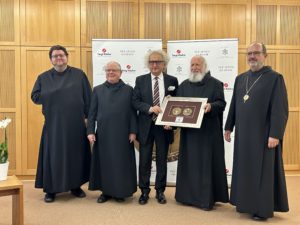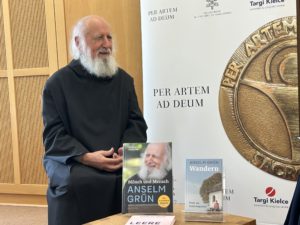 Anselm Grün received the medal Per Artem Ad Deum 2023 in the Münsterschwarzach Abbey from the hands of President of Targi Kielce’s Board, Andrzej Mochoń PhD. In the meeting took part also Michael Reepen OSB, the abbot of Abtei Münsterschwarzach, Br. Dr Ansgar Stüfe OSB publishing director of the Vier-Türme-Verlag in Münsterschwarzach, employees of the publishing-house and the administration of the abbey.
Anselm Grün received the medal Per Artem Ad Deum 2023 in the Münsterschwarzach Abbey from the hands of President of Targi Kielce’s Board, Andrzej Mochoń PhD. In the meeting took part also Michael Reepen OSB, the abbot of Abtei Münsterschwarzach, Br. Dr Ansgar Stüfe OSB publishing director of the Vier-Türme-Verlag in Münsterschwarzach, employees of the publishing-house and the administration of the abbey.
Author Archives: Magda Cholewa
Theologian, writer, Benedictine monk – Father Anselm Grün awarded Per Artem Ad Deum 2023!
 Father Anselm Grün awarded the Per Artem Ad Deum Medal 2023 for “the wisdom of the word that is a guide on the paths of daily life.”
Father Anselm Grün awarded the Per Artem Ad Deum Medal 2023 for “the wisdom of the word that is a guide on the paths of daily life.”
Father Anselm Grün born on 14 January 1945 in Junkershausen, in 1964, having passed high school leaving examination at the Riemenschneider-Gymnasium in Würzburg, he joined the Benedictine monks at the Münsterschwarzach abbey, where he began his novitiate.
From 1965 to 1971, he studied philosophy and theology at St. Ottilien and in Rome. In 1974 he received his doctorate in theology. From 1974 to 1976 he studied management in Nuremberg. Since 1977, he has been responsible for the management of the estate of the Münsterschwarzach Abbey.
An expert in psychology and psychotherapy, specialising people
and enterprises management, internal development, overcoming negative feelings and emotions, as well as self-esteem and dignity development.
His first book – “Purity of Heart” was first published in 1976; since then he has written 250 publication,
with the total circulation of over 14 million copies. Fr. Anselm offers courses for management boards at the largest German corporations, as well as courses for ordinary people who want to find happiness in their personal lives.
Anselm Grün’s books have been published in over 3 million copies and translated into over 30 languages (including Chinese, Polish, Spanish, Danish, Portuguese, Czech, English, Korean, Romanian, Ukrainian, Estonian, Croatian, Swedish, Hungarian, French, Danish, Serbian, Italian, Norwegian, Slovak).
We encourage you to put forward your preferred candidates for the PER ARTEM AD DEUM 2023 award!
New rules related to selecting Per Artem Ad Deum laureates selection.
According to “Praedicate Evangelium”, the new Roman Curia apostolic constitution, the former Congregation for Catholic Education and the Pontifical Council for Cultures were merged into one body. Thus a new body – Dicastery for Culture and Education, was created. The next Per Artem Ad Deum laureate will be selected in 2024.
The accolade will be presented at the upcoming International Exhibition of Church Construction, Church Fittings and Furnishings and Religious Art SACROEXPO.
We wholeheartedly encourage you to submit candidates for the Per Artem Ad Deum Medal 2024. The candidate nomination form is available here.
